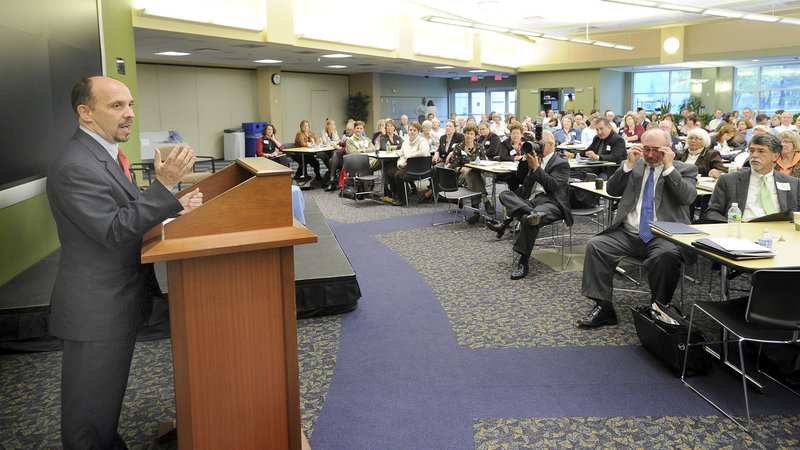PORTLAND – Speakers at an education symposium Thursday said businesses, academia and government must work together to reform education and increase the number of Mainers with college degrees.
Among the speakers at the event, called the Sixth Maine Symposium on Higher Education, was Gov. Paul LePage, who called for improvements to Maine’s vocational and technical schooling programs.
According to data presented at the meeting, 60 percent of U.S. jobs will require post-secondary education by 2018. But in 2010, only 39 percent of adults in Maine had an associate’s degrees or higher. The New England average was 47 percent.
There’s another problem, too: Educated workers often lack the skills that employers seek, said John Dorrer, program director at the nonprofit group Jobs for the Future and former acting commissioner of the Maine Department of Labor.
As a result, employers are struggling to find qualified workers, even though an average of four candidates apply for every open job. Dorrer said the shortage of qualified employees will become more acute as older workers retire.
“If we do not succeed in rebuilding and retooling our human capital, I shudder to think what we will be left with in the future,” said Dorrer.
Doug Drew, guidance counselor at Portland High School, said schools should partner with local businesses to prepare students for real-world jobs.
“The movement at the high school level needs to be getting kids into (the workplace),” said Drew. He advocates expanding internship and job shadow programs, which he said teach skills that can’t be taught “in the silos of high school.”
A number of companies were honored at the event for promoting higher education. Among them was Yarmouth-based Fluid Imaging Technologies, which encourages employees with newborn children to apply for a Harold Alfond grant that gives every Maine baby $500 toward higher-education costs.
Fluid Imaging CEO Kent Peterson said the grants are a first step that parents can take toward saving for their children’s college expenses. But he said education reform will require the support of private industry, which can partner with schools and provide jobs for college graduates.
“Until more for-profit players are (involved), we will not be as efficient as we can to solve these problems,” he said.
Jamie Merisotis, a keynote speaker who is president and CEO of Indianapolis-based Lumina Foundation, a higher-education advocacy group, said Maine trails other states in education reform initiatives.
For instance, he said, Arizona has taken steps to increase access to higher education. And Arizona State University has restructured departments and eliminated the traditional semester schedule to boost efficiency and to focus more on teaching job-critical skills.
“Maine will put itself at some peril if it doesn’t (realize) the need for change,” said Merisotis. “This is not something that would be nice to do, this is something that we have to do.”
Gov. LePage stressed the need for more emphasis on vocational and technical education, which can prepare students for high-demand jobs, such as those involving construction and heavy equipment operation.
“The more choices, the better. Not every child is born for academics,” LePage said.
He also stressed the need for quality teachers. “I am looking to find all of the teachers of the year and the candidates . . . to find common denominators of what makes a good teacher,” he said.
LePage said teaching techniques should be flexible enough to accommodate different learning styles, and that tests shouldn’t be the only measure of academic success.
“We all learn differently and must customize our education system to the needs of the child,” he said. “It’s never been about grades, it’s about effort.”
Jonathan Hemmerdinger can be reached at 791-6316 or: jhemmerdinger@mainetoday.com
Send questions/comments to the editors.


